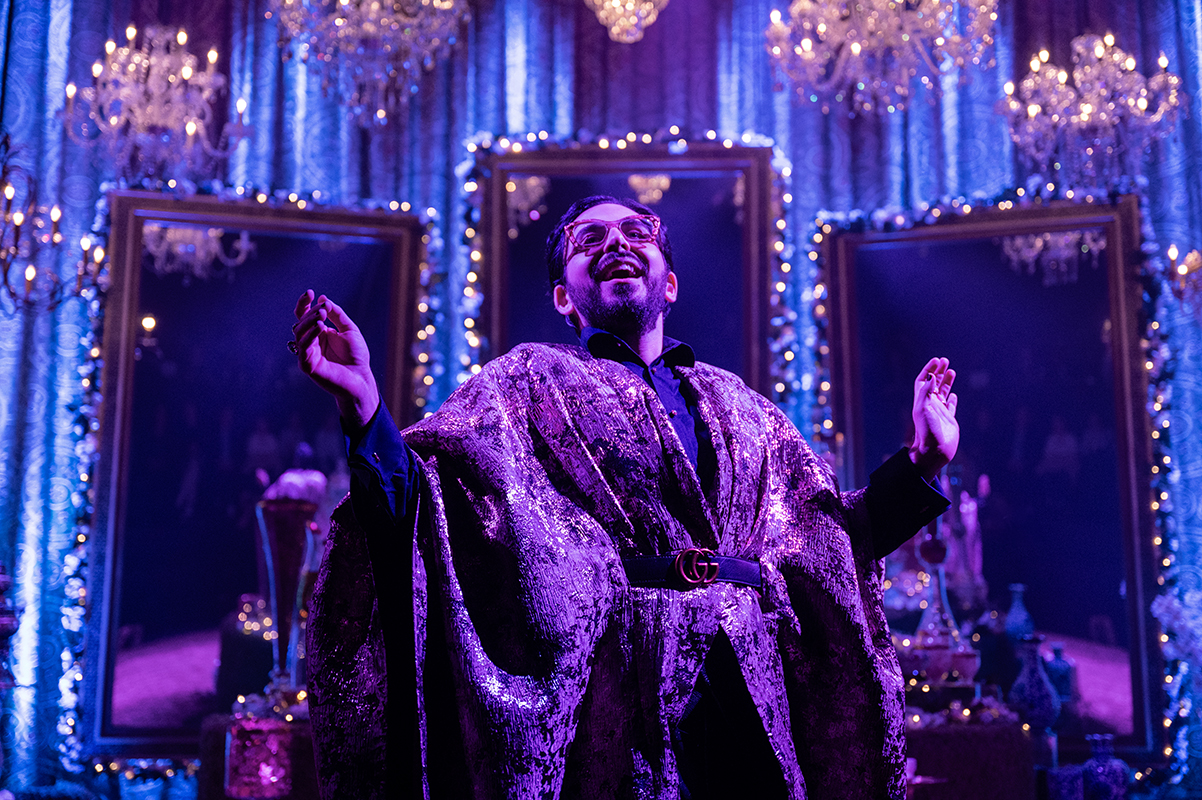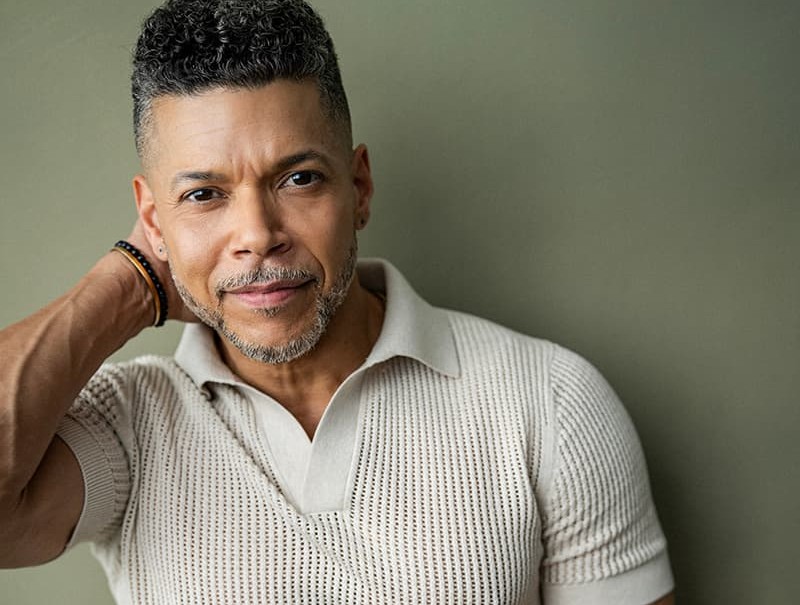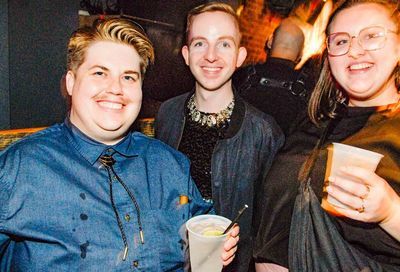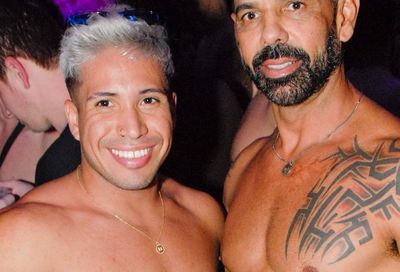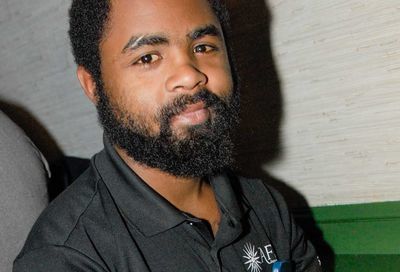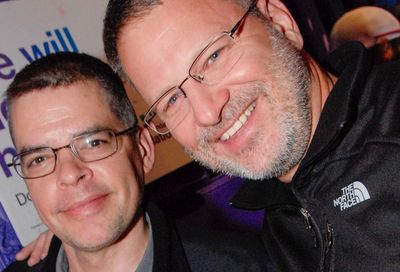Exclusive: Ricky Martin on the power of music, Pulse Nightclub, and why he supports Hillary
Pop superstar Ricky Martin came out in 2010. Six years later, he's never been happier -- or hotter.

“Hey, man!”
Ricky Martin bursts forth with an immediate warmth and familiarity, an ebullience one doesn’t generally encounter when interviewing international superstars by phone.
And then comes the graciousness.
“Thank you for your time.”
Celebrities never say that.
Unfortunately, our time is short — a strict 20 minutes has been allotted by Martin’s people for our exclusive interview. Yet on this Monday morning, Ricky Martin is in a bright, joyful mood, more than happy to talk about the impact coming out has had on his life six years after the fact, his deep-rooted feelings over the Pulse nightclub tragedy (the majority of the victims were not just gay, but Puerto Rican), and the importance of getting out the vote for his candidate of choice, Hillary Clinton.
He recoils briefly when the name George W. Bush is mentioned — Martin headlined Number 43’s inaugural in 2001 — and sets the record straight, even before hearing the full question. He wants to be very, very clear: He’s a Democrat. One hundred percent, tried-and-true Democrat. He supported Obama. He supports Clinton. Case closed.
Martin, currently on a world tour that will arrive at Wolf Trap on Wednesday, August 24 and Thursday, August 25 (it’s one of only two planned stops in the states — the other being Hollywood, Florida), is one of the music world’s most formidable entertainers, one who helped to bridge the cultural gap between Spanish and English language recordings. Though his biggest hit remains 1999’s “Livin’ La Vida Loca,” a song with an infectious hook and a sexy, growling delivery, he’s had several noteworthy singles since — culled from an array of 11 solo albums, including A Quien Quiera Escuchar, awarded a 2016 Grammy (his second) for Best Latin Pop Album. He’s had a modest acting career, including roles on General Hospital and Glee, and two stints on Broadway, in Les Miz and Evita. He’s been a coach on The Voice Australia, The Voice Arabia and La Voz… Mexico. And he’s also the author of a children’s book — Santiago the Dreamer — as well as Me, a memoir that spent several weeks atop the New York Times bestseller list.
Children, arguably, are the cause dearest to his heart. As head of the Ricky Martin Foundation, he advocates for the global well-being of children. It’s exactly what you’d expect from the father of eight-year-old twin boys.
Ricky Martin is not merely a great entertainer — he’s a genuinely great human being. To the point where his home nation of Puerto Rico declared August 31, 2008, to be International Ricky Martin Day. Not bad for a guy who, in 1984, was rejected from his first audition for the Puerto Rican boy band Menudo as being too short.
Good thing they came to their senses after audition number three.

METRO WEEKLY: Hi, Ricky.
RICKY MARTIN: Hey, Randy! How you doing, man? Thank you for your time!
MW: No, thank you for your time. This is a great honor.
MARTIN: Where are you based out of?
MW: Washington, D.C. We’re an LGBT publication here.
MARTIN: Oh, man. I’m glad we’re doing it!
MW: Well, at least you know I’m not going to ask you if you’re gay.
MARTIN: [Laughs.] Why not, man?
MW: Maybe I should.
MARTIN: [Laughs.] “First question: Are you gay?”
MW: “First question: Can you confirm the rumors that you’re gay?”
MARTIN: [Laughs.] I’m as gay as they come, man! What can I say?
MW: Okay, then let’s start there. What is it like to go through years of being asked by the press and not really being able to answer that honestly and openly? I don’t think most of us can even perceive of what that kind of stress that is, to hide your sexuality publicly.
MARTIN: You’re full of fear, you know? For many years, you’re just obsessed with acceptance, but according to your beliefs, and your religion, and maybe a little bit of your culture as well, it tells you that to feel this way is evil — it’s something that I don’t wish upon anyone.
But I’ve said it many times: I wish I could come out again, man, because the feeling was so beautiful. It’s so amazing that it’s like, “Man, why didn’t I do it before?” Everybody goes through this process. It’s easier for some, and it’s really difficult for others. There are many men and women out there that unfortunately die without being able to go through the coming out process. That’s really sad. I consider myself someone very lucky. After I came out, the love that I received from the audience, from the media, from my family….
MW: But in your case, and in the case of many other celebrities, you are constantly barraged by the press. I mean, here you are, a musician, trying to make music, you’re trying to entertain, and yet your personal life becomes such a focal point. That can’t be easy to navigate.
MARTIN: It was worse for me in a sense because my religion — and even my culture — was telling me that it was bad to feel what I was feeling. I went through it. It was very — I would say painful, but I am a survivor in the sense that I’m here. I’m alive. A lot of people in the process, unfortunately, they look for a gun and decide to end their lives. That was not my case. So today, what can we do? Be an example. And let people know that you can do whatever you want in life. Your sexual identity has nothing to do with how far you can go in life.

MW: You came out in 2010, before we had gay marriage, before all the battles for our rights really began to turn the tide. How do you feel when you look at how far things have come in such a short time?
MARTIN: Listen. When you’re walking down the street, or when you’re doing an in-store, and you’re getting to meet your fans, or even through social media, and you read or hear about testimonies of people, saying, “Ricky, thanks. Thanks for coming out, because the day you came out, I realized that it was okay to be gay,” especially for the Latin community here in the United States. When I go to countries like Argentina, Colombia, Venezuela, Costa Rica, Nicaragua, and meet with the LGBT community, and meet with people that are struggling with their identity in these countries, and they tell me that because of how I came out, it made it way easier for them, that’s what I take with me. Today, all I do is celebrate my sexual identity. I’m proud of who I am.
MW: Did you notice a change in your fan base at all? Was it even perceptible?
MARTIN: The day I came out, a million people started following me on Twitter. That same day.
MW: That’s a big change.
MARTIN: It is a big, positive change. A lot of people told me, “Ricky, you’re going to lose your female fan base.” I think it’s quite the opposite. All the fears were in my head. When I came out, everything was better.
It shouldn’t matter. Then again, we live in show business. It’s full of fantasy, so the audience, they create a certain image in their heads about the artists they follow. I understood what people were telling me, but they were all wrong. I’m still selling out arenas. I’m still selling out stadiums. And it’s really something that I shouldn’t be concerned about. No one should be.
MW: You’ve been in the music industry for over 25 years….
MARTIN: I started when I was 12, and I am now 44 years old. It’s been a while.

MW: What has music done for you in your life? What has it brought to you, being part of this process?
MARTIN: To be able to talk about my culture through music, with the rhythms that I use, with the instrumentation that I use, to be able to create fusion between Latin and Anglo and African sounds, to go to continents like Asia, and to go to countries like Japan, Korea, even China, and perform, and to see people reacting to these ethnic sounds I tend to work with — and to see people enjoying them as if they grew up listening to these ethnic sounds — is something that really moves me, really inspires me. To see how boundaries are broken, and how beautiful it is to unite cultures through music — it’s something that you can’t explain, really. To see people in China, singing to songs in English and in Spanish, is incredibly special. That’s what keeps me here.
Ten years ago, I said, “I think I’m going to retire. I’ve done everything I wanted. I am in a comfortable position for me to say goodbye.” But I didn’t. Because the reaction of the audience through social media is, like, “When are we going to see you in concert?” And then there’s my need to be on stage and perform. It’s my playground. It’s where I become a child again.
MW: So you still get the same rush out of performing that you did 25 years ago?
MARTIN: Every day is completely different, but yes, at the end of the show, when you see people of different cultural backgrounds and different generations going at it, and what I mean by going at it, Randy, is people really allowing themselves to feel free for an hour and forty-five minutes of concert. That’s when I said, “Okay, we’re doing something right, and we must keep doing this.” That’s what my show is about — it’s an hour and forty-five minutes where I challenge the audience to forget about all their issues in life, and for once, not feel judged, and not judge who’s standing next to you, who’s dancing without a rhythm, but is still dancing. That is what moves me and what inspires me to keep doing this.
MW: I know you’re a very spiritual person. And we live in a very difficult time right now. A lot of your music is just ebullient. In a sense, you’re performing a spiritual service for people.
MARTIN: I appreciate that, and I thank you for it. Yes. Through social media, or once again, walking down the street, you meet a girl that tells you, “I went to your show two months ago. Thank you so much.” Then, she goes off telling you how her life was before the show, and how she felt bad about herself, she felt she was full of insecurities, and all of a sudden after the show, it was like a turning point for her. That happens to me quite often, Randy. It is very special, so it is a big responsibility, but it’s something that I take with — how can I say this in English? — I take with pride. That’s why I keep doing this. Apparently my music, my performance, my entertainment heals people in different ways. I don’t want to sound arrogant or weird about this, but it’s something that I get every day, and it makes me happy.

MW: In June, we had the horrible tragedy at Pulse nightclub in Orlando. So many of the victims there were Puerto Rican, as well as gay. How did you feel when you heard about it? Particularly since it’s so tightly connected with your own nationality.
MARTIN: I was spending my summer in the south of France, and then this happened. I was devastated for obvious reasons. But I also have friends who had friends in that club that night. In order for me to get rid of my anger, and my frustration, I wrote an essay. I was able to talk to the families of the victims, because apparently they wanted to hear me, but I also needed to hear them in order for me to heal, if you know what I mean. It’s “How can I get rid of this anger? How can I get rid of this frustration? How can I get rid of this uncertainty?”
Well, my healing approach was being as close to the victims as I could, and yes, I talked to a few of them. It is horrible. What can I say, Randy? This is something that needs to stop. That’s why every time I post a picture of me with my family on Instagram, or on social media, one, I want to share because I am proud of my family, but I also want to share because I know that that picture will reach millions of men and women who are struggling with their identity, that because of attacks like this, they feel afraid of accepting themselves, and I think that part of my mission in life is to let the world know that there’s nothing wrong with loving and being loved.
MW: There was a point where you performed for George W. Bush. But you —
MARTIN: Wait, wait, wait, wait, wait. When I hear that I get nervous and I start sweating immediately. I was a young entertainer, seduced by fame and glory. I’m going to tell you the line that my manager at the moment brought me. He told me, “You are invited to sing at the ceremony, and you have the opportunity to represent the Latino community. Would you do it?” I said, “Yes.” I am a Democrat. I supported Barack Obama. I campaigned for Barack Obama — and this is even before I came out. Now, I’m supporting — and I am campaigning for — Hillary Clinton. I am a Democrat.
MW: I didn’t think you weren’t. My point was going to be Bush seems tame by comparison of what we’ve got up going right now, with Trump. How do you feel about the fact that he’s fomenting racism in this country?
MARTIN: Well, I think that this is critical. We need to show up, and we need to vote, and we need to vote for a country free from hate. We’ve taken so many amazing steps towards a future free of prejudice. When you see this man talking, it is scary. Not only for me, but for all my friends from different parts of the world. They are alarmed of what this world could become if someone like Trump gets to the White House. My activism in politics is based on “Let’s get out [and vote].” Especially to the Latino community. We need to show up. We need to vote. We need to make sure that wall is not built — which makes no sense, because just the idea of a wall separating us is ridiculous. I will not stop until the day of the election.
MW: I was astonished when he said that Mexicans were rapists and murderers. When he announced his campaign with that, I thought, “Well, he’s never going to get past the starting gate.”
MARTIN: Yet he is.
MW: Yet he is.
MARTIN: We have to go out and vote.

MW: Hillary has her own issues, though. There are a lot of people looking for alternatives. What would you say to those who would vote for someone other than Hillary at this point, as a vote for an independent candidate could conceivably help put Trump in the White House?
MARTIN: Well, you know what? That’s when someone like Bernie Sanders comes in. He needs to campaign for Hillary. He needs to bring his crowd, and vote for a woman that is so prepared to be in the White House.
MW: Let me ask you about fatherhood very quickly. What has fatherhood brought to you? What is it like to be a dad?
MARTIN: It is the most beautiful thing that has ever happened to me. Every day is something new. Every day is full of surprises. My kids are eight years old, and time just flies. I don’t know how I went from buying diapers to buying school uniforms. A lot of people tell me, “Yeah, it’s a big responsibility.” Yes, it is a big responsibility. It’s not about you anymore. It’s about them. Every decision that I make is based on their well-being. I’m only starting. I want a bigger family, to be honest.
MW: What values do you impart on your children?
MARTIN: For them not to judge. For them to see the similarities instead of the differences in people. I think I’m doing a really good job at it.
MW: You’re coming to Wolf Trap for two shows. What do you want people to come away with from your concert?
MARTIN: I need them to first of all know that their attire has to be as comfortable as possible, because they will dance like crazy. And they will sweat. I want them to allow themselves to be free for an hour and forty five minutes, and literally forget about all the issues in life. Just be free. Just be happy. I promise they will remember the show with joy. It’s going to be fun — a lot of fun. It’s a big carnival. Get ready.
Ricky Martin appears on Wednesday, Aug. 24, and Thursday, Aug. 25, at 8 p.m. at The Filene Center at Wolf Trap, 1551 Trap Road, Vienna. Tickets are $45 to $125. Call 877-WOLFTRAP or visit wolftrap.org.
Click here to win tickets to see Ricky Martin at Wolf Trap!
Related:
Dolly Parton: “I don’t think about whether you’re straight or gay, I just love you”
Support Metro Weekly’s Journalism
These are challenging times for news organizations. And yet it’s crucial we stay active and provide vital resources and information to both our local readers and the world. So won’t you please take a moment and consider supporting Metro Weekly with a membership? For as little as $5 a month, you can help ensure Metro Weekly magazine and MetroWeekly.com remain free, viable resources as we provide the best, most diverse, culturally-resonant LGBTQ coverage in both the D.C. region and around the world. Memberships come with exclusive perks and discounts, your own personal digital delivery of each week’s magazine (and an archive), access to our Member's Lounge when it launches this fall, and exclusive members-only items like Metro Weekly Membership Mugs and Tote Bags! Check out all our membership levels here and please join us today!






